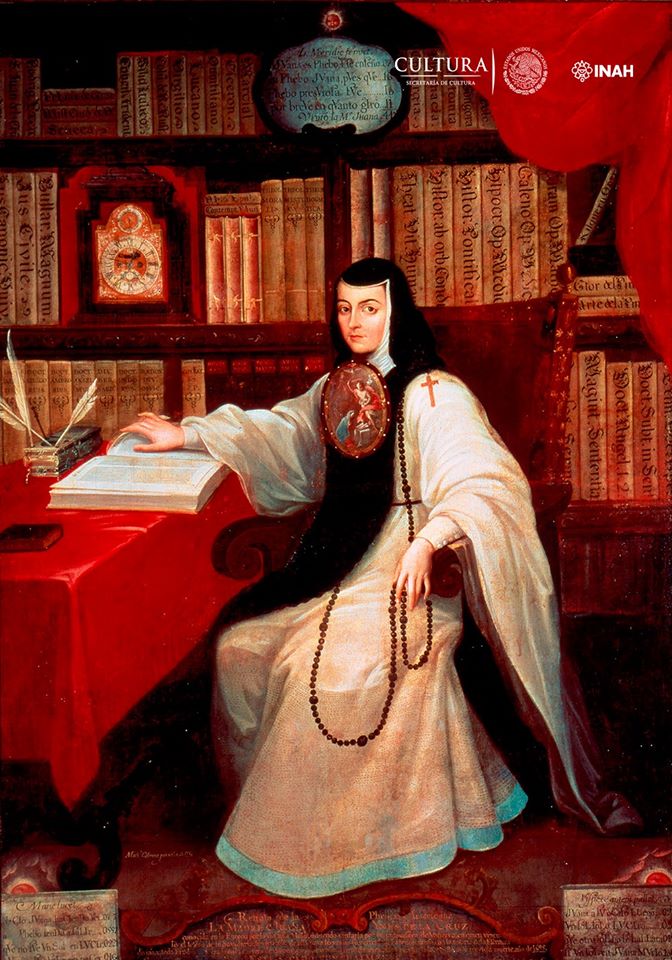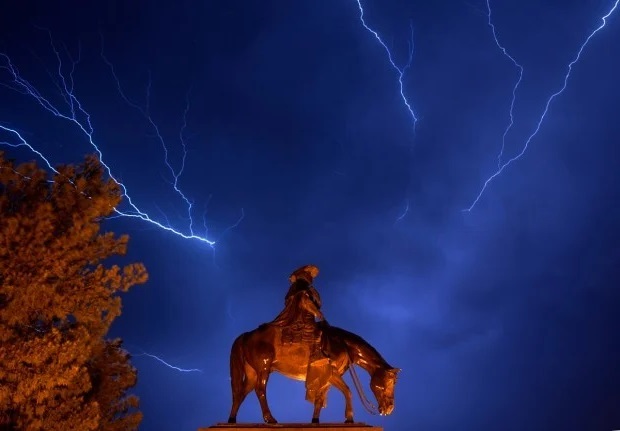Poem About Padre Kino
Sor Juana Inés de La Cruz
Soneto
por Sor Juana Inés de la Cruz
Sonnet
by Sor Juana Inés de la Cruz
Aplaude La Ciencia Astronomica Del
Padre Eusebio Francisco Kino,
De La Campania De Jesus,
Que Escribio Del Cometa
Que El Ano De Ochenta [1680]
Aparecio, Absoiviendole De Ominoso
Praising The Astronomical Science Of
Father Eusebio Francisco Kino
Of The Company Of Jesus,
Who Wrote About The Comet That Appeared In 1680,
Absolving It Of Evil Portent
Aunque es clara del Cielo la luz pura,
clara la Luna y claras las Estrellas,
y claras las efimeras centellas
que el aire eleva y el incendio apura;
aunque es el rayo claro, cuya dura
produccion cuesta al viento mil
querellas, y el relampago que hizo de sus
huellas medrosa luz en la tiniebla obscura;
todo el conocimiento torpe humano
se estuvo obscuro sin que las mortaies
plumas pudiesen ser, con vuelo ufano,
Icaros de discursos racionales,
hasta que el tuyo, Eusebio soberano, les dio luz alas Luces celestials.
Sor Juana Ines de la Cruz, Obras Completas, (Editorial Parma, S.A., 1972) 163.
Although heaven's pure light is bright, bright the moon and bright the stars, and bright are the fleeting lightening flashes that are borne by the air and sped by fire;
even though lightening is bright, its laborious production costs the wind a thousand discords, and the flash produced in its path is a dreadful light in gloomy blackness;
all dull human knowledge is obscure without mortal plumage being able to be,
with proud flight,
Icarian in rational discourses, until yours,
superb Eusebio, you brought light to the celestial lights.
Translated by Fred McAninch. The original Spanish sonnet can be found in Sor Juana Ines de la Cruz, Obras Completas, (Editorial Porrua, SA, 1972) 163.
Commentary by Octavio Paz
"Examining Sor Juana's library allows us to understand better her sonnet "in praise of the astronomical science" of Father Eusebio Kino. In it she refers to the Jesuit's writings on the Comet of 1680 that had excited Europe and the America.
Among the few persons in Mexico to whom Father Kino sent his "Exposition" was Sor Juana. Her response was a sonnet (205) in which she places him, literally, above the comets, that is, in the incorruptible highest heavens. Sor Juana capped her praise by saying that the "heavenly lights received light' from Kino's learning.
[Seventeenth century New Spain] was … the century of missionaries like Father Kino, mystics like Catherine Suárez, and ascetics like the Archbishop of Mexico, Francisco Aguiar y Seijas and Father Antonio Núñez de Miranda, Sor Juana's confessor. [Sor Juana] was visited by and sought after by high officials, ladies of nobility, military men, homilists and illustrious travelers like Father Kino."
Octavio Paz
"Sor Juana Inés de la Cruz, o, Las trampas de la fe"
1982
"Sor Juana, Or, the Traps of Faith"
English translation by Margaret Sayers Peden
Commentary by Dr. Jorge Olvera
"Sor Juana was well aware that more important than trivial scholarly disputes was the fact that Kino was not only giving light to the under standing of astronomy, but he was about to give his entire life in a stronger light to a better cause as a missionary. His was to be the cause of the poor and forsaken tribes of the northern deserts, even as Christ had given his life to enlighten the world, which was in darkness. This is what the poem is about: light and darkness. It has a dramatic connotation, one which evokes the darkness that took place at the time of the crucifixion of Christ, with the lightning, thunder, and furious wind breaking through. All dull and vile knowledge says - Sor Juana - came a standstill. No pens of mortals could rise proud in Icarian fashion with rational discourses until yours, Eusebio, gave illumination to those heavenly lights. (Here I am trying to convey the inner sense of the poem.)
If this poem were only praising Kino the man, it would have been hyperbolic and idolatrous. Sor Juana evidently meant that Kino was giving forth a greater light by his apostolic example, saying at the same time that his observations were enlightening. All this is presented in the beautiful, metaphorical way possible only in poetry.
The poem is in the very style of Sor Juana, one which conceals hidden meanings. She dedicated the lines to Kino when she knew he was about to leave the comforts of the civilized world - perhaps forever for the dangerous and unknown deserts on the Rim of Christendom."
Dr. Jorge Olvera H.
"Finding Father Kino: The Discovery of the remains of Father Eusebio Francisco Kino, S.J. 1965-1966"
Letter From Royal Audencia to Father Kino 1705
The hopes that your Reverence may make a journey to Mexico [City] have comforted me greatly. I imagine I see you there already, as on the former occasion, like a lightning-flash, quick and refulgent, but without destruction …
Don Joseph de Miranda Villa y San
Royal Audiencia of Guadalajara,
Letter to Kino dated March 31, 1705
In "Kino's Historical Memoir of Pimería Alta; A contemporary Account of the
Beginnings of California, Sonora, and Arizona" [Vol. 1] 1919
Dr. Herbert E. Bolton, Translator and Editor
Print Poem in Spanish and English, click Poem

